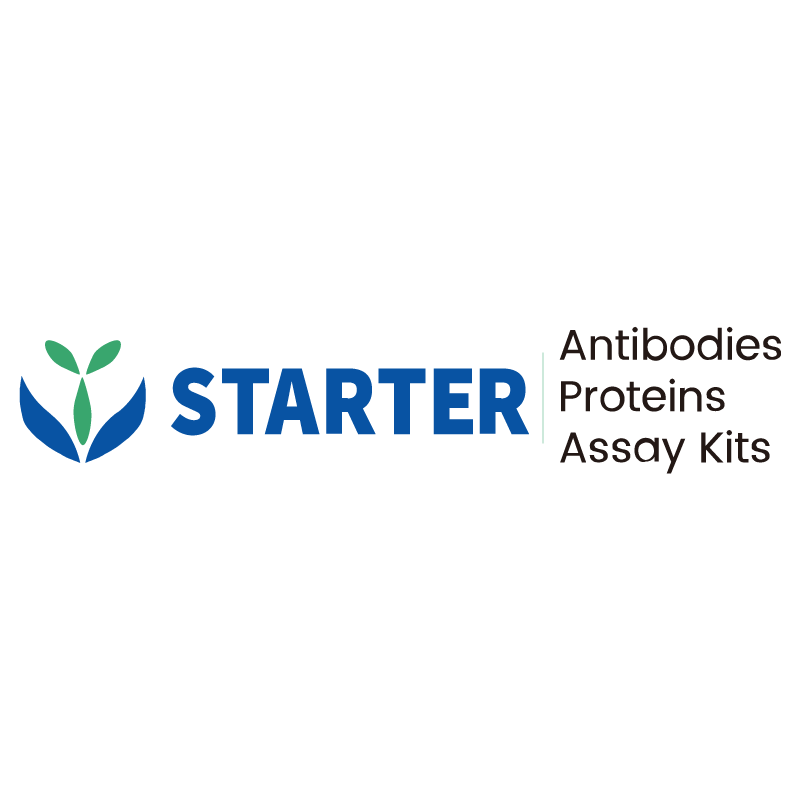WB result of KDM4A Recombinant Rabbit mAb
Primary antibody: KDM4A Recombinant Rabbit mAb at 1/1000 dilution
Lane 1: NCCIT whole cell lysate 20 µg
Secondary antibody: Goat Anti-rabbit IgG, (H+L), HRP conjugated at 1/10000 dilution
Predicted MW: 120 kDa
Observed MW: 150 kDa
Product Details
Product Details
Product Specification
| Host | Rabbit |
| Antigen | KDM4A |
| Synonyms | Lysine-specific demethylase 4A; JmjC domain-containing histone demethylation protein 3A; Jumonji domain-containing protein 2A; [histone H3]-trimethyl-L-lysine(36) demethylase 4A; [histone H3]-trimethyl-L-lysine(9) demethylase 4A; JHDM3A; JMJD2; JMJD2A; KIAA0677 |
| Immunogen | Synthetic Peptide |
| Location | Nucleus |
| Accession | O75164 |
| Clone Number | S-957-138 |
| Antibody Type | Recombinant mAb |
| Isotype | IgG |
| Application | WB, IHC-P, ICC |
| Reactivity | Hu, Ms, Rt |
| Positive Sample | HEK-293, LNCaP, MCF7, HeLa, SH-SY5Y, NIH/3T3, PC-12 |
| Predicted Reactivity | Or |
| Purification | Protein A |
| Concentration | 2 mg/ml |
| Conjugation | Unconjugated |
| Physical Appearance | Liquid |
| Storage Buffer | PBS, 40% Glycerol, 0.05% BSA, 0.03% Proclin 300 |
| Stability & Storage | 12 months from date of receipt / reconstitution, -20 °C as supplied |
Dilution
| application | dilution | species |
| WB | 1:1000-1:4000 | Hu, Ms, Rt |
| IHC-P | 1:100 | Hu, Ms, Rt |
| ICC | 1:1000-1:2000 | Hu, Ms |
Background
KDM4A (also known as JMJD2A, JHDM3A) is a 125 kDa Fe(II)- and α-ketoglutarate-dependent nuclear histone demethylase that specifically removes di- and tri-methyl marks from H3K9 and H3K36, thereby acting as a transcriptional repressor or activator, depending on context, to modulate chromatin structure and gene expression; it cycles in abundance through G1/S to G2/M via ubiquitin-proteasome control, localizes to nucleoli where it associates with rDNA and RNA polymerase I, participates in replication timing and site-specific DNA re-replication, and also localizes to centrosomes where its enzymatic activity safeguards centrosome integrity and mitotic fidelity, while its dysregulation is linked to diverse cancers and other diseases, making it a therapeutic and diagnostic target.
Picture
Picture
Western Blot
WB result of KDM4A Recombinant Rabbit mAb
Primary antibody: KDM4A Recombinant Rabbit mAb at 1/1000 dilution
Lane 1: HEK-293 whole cell lysate 20 µg
Lane 2: LNCaP whole cell lysate 20 µg
Lane 3: MCF7 whole cell lysate 20 µg
Lane 4: HeLa whole cell lysate 20 µg
Lane 5: SH-SY5Y whole cell lysate 20 µg
Secondary antibody: Goat Anti-rabbit IgG, (H+L), HRP conjugated at 1/10000 dilution
Predicted MW: 120 kDa
Observed MW: 150 kDa
This blot was developed with high sensitivity substrate
WB result of KDM4A Recombinant Rabbit mAb
Primary antibody: KDM4A Recombinant Rabbit mAb at 1/1000 dilution
Lane 1: NIH/3T3 whole cell lysate 20 µg
Secondary antibody: Goat Anti-rabbit IgG, (H+L), HRP conjugated at 1/10000 dilution
Predicted MW: 120 kDa
Observed MW: 150 kDa
This blot was developed with high sensitivity substrate
WB result of KDM4A Recombinant Rabbit mAb
Primary antibody: KDM4A Recombinant Rabbit mAb at 1/1000 dilution
Lane 1: PC-12 whole cell lysate 20 µg
Secondary antibody: Goat Anti-rabbit IgG, (H+L), HRP conjugated at 1/10000 dilution
Predicted MW: 120 kDa
Observed MW: 150 kDa
This blot was developed with high sensitivity substrate
Immunohistochemistry
IHC shows positive staining in paraffin-embedded human kidney. Anti-KDM4A antibody was used at 1/100 dilution, followed by a HRP Polymer for Mouse & Rabbit IgG (ready to use). Counterstained with hematoxylin. Heat mediated antigen retrieval with Tris/EDTA buffer pH9.0 was performed before commencing with IHC staining protocol.
IHC shows positive staining in paraffin-embedded human colon. Anti-KDM4A antibody was used at 1/100 dilution, followed by a HRP Polymer for Mouse & Rabbit IgG (ready to use). Counterstained with hematoxylin. Heat mediated antigen retrieval with Tris/EDTA buffer pH9.0 was performed before commencing with IHC staining protocol.
IHC shows positive staining in paraffin-embedded human breast cancer. Anti-KDM4A antibody was used at 1/100 dilution, followed by a HRP Polymer for Mouse & Rabbit IgG (ready to use). Counterstained with hematoxylin. Heat mediated antigen retrieval with Tris/EDTA buffer pH9.0 was performed before commencing with IHC staining protocol.
IHC shows positive staining in paraffin-embedded human colon cancer. Anti-KDM4A antibody was used at 1/100 dilution, followed by a HRP Polymer for Mouse & Rabbit IgG (ready to use). Counterstained with hematoxylin. Heat mediated antigen retrieval with Tris/EDTA buffer pH9.0 was performed before commencing with IHC staining protocol.
IHC shows positive staining in paraffin-embedded mouse testis. Anti-KDM4A antibody was used at 1/100 dilution, followed by a HRP Polymer for Mouse & Rabbit IgG (ready to use). Counterstained with hematoxylin. Heat mediated antigen retrieval with Tris/EDTA buffer pH9.0 was performed before commencing with IHC staining protocol.
IHC shows positive staining in paraffin-embedded rat testis. Anti-KDM4A antibody was used at 1/100 dilution, followed by a HRP Polymer for Mouse & Rabbit IgG (ready to use). Counterstained with hematoxylin. Heat mediated antigen retrieval with Tris/EDTA buffer pH9.0 was performed before commencing with IHC staining protocol.
Immunocytochemistry
ICC shows positive staining in NCCIT cells. Anti-KDM4A antibody was used at 1/500 dilution (Green) and incubated overnight at 4°C. Goat polyclonal Antibody to Rabbit IgG - H&L (Alexa Fluor® 488) was used as secondary antibody at 1/1000 dilution. The cells were fixed with 100% ice-cold methanol and permeabilized with 0.1% PBS-Triton X-100. Nuclei were counterstained with DAPI (Blue). Counterstain with tubulin (Red).
ICC shows positive staining in NIH/3T3 cells. Anti-KDM4A antibody was used at 1/500 dilution (Green) and incubated overnight at 4°C. Goat polyclonal Antibody to Rabbit IgG - H&L (Alexa Fluor® 488) was used as secondary antibody at 1/1000 dilution. The cells were fixed with 100% ice-cold methanol and permeabilized with 0.1% PBS-Triton X-100. Nuclei were counterstained with DAPI (Blue). Counterstain with tubulin (Red).


